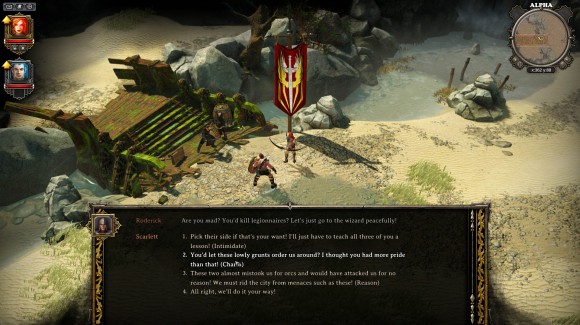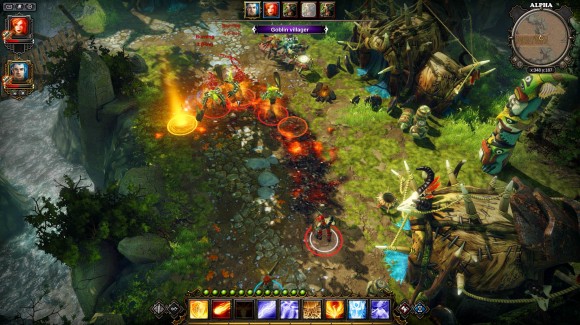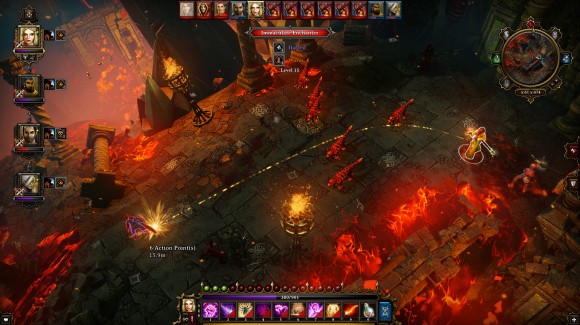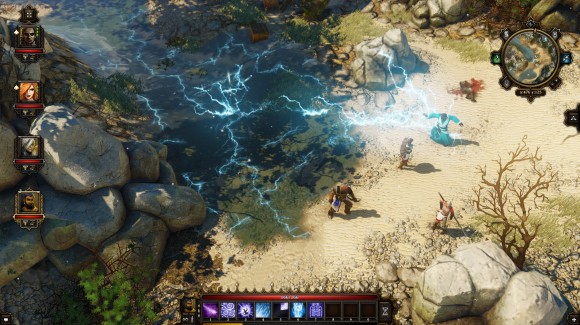Divinity Original Sin is one of many games released this year that has roots with Kickstarter. Unlike many of its crowd-funded compatriots, Divinity was already well into development, having been funded two years prior by the sales of the Divinity Anthology, a collection of prior games in the franchise. Despite having played a lot of games of this type and being quite fond of them, I never played a Divinity game before. As a newcomer to the franchise, I was not sure what to expect as I launched the game. What awaited me was a game that brought together the best of the classic isometric CRPG design, with a modernized interface and twists that make it delightful to play.
In Divinity Original Sin you form a party of two Source Hunters, members of an organization that hunts users of Source, a powerful and evil magic. You have been called to the city of Cyseal to investigate a murder which is suspected to be the work of “Sourcerors”. Upon arrival you find Cyseal under siege from an orc invasion, blighted by an undead curse, and suffering from an occupation from a legion and an incompetent mayor. In short, things are not going well, and then, things get cosmically worse. I will avoid spoiling the story, as it is one of the strongest points of the game. Much like some of the quests, it does like to play with the unexpected. One minute you are talking about the fate of space and time, while the next quest will have you helping a tavern cat hook up with the hot mayor’s cat.
The game has you create two protagonists because one of its features is co-op multi-player. The game is still designed for a player to play solo and it does so by having that player take control of both leads. For the most part controlling two leads works just fine, except for some sessions where each character is asked to make a choice. It works well to role play your characters as separate individuals, but it feels more like this system this was meant to give a pair of players the chance to make their own decisions while playing together. During your travels you will pick up companions that will ask to tag along in your quest, and eventually you will also be given the choice to hire henchmen to aid you if it makes more sense for the builds of your two heroes. The two characters that join your quest early on do have their own distinctive personalities, but choices you make, even some that seem to go against their personality seem to have no effect on their opinion of you or their availability.
You will need these companions because Divinity Original Sin does not pull any punches when it comes to its turn based combat. At the start of combat you will have a pool of action points, which are consumed when performing actions. Moving, casting spells, attacking, and any other actions you take will consume this precious resource. You also have the choice to skip your turn or part of your turn, which will cause these action points to carry over to the next round. This leads to interesting choices. Do you let an enemy come to you and save all of your points to hit him hard the next round? Do you spend your turn moving towards a better vantage point and not attack? Do you take a chance at a long range spell that might miss? Of course enemies have similar capacities, they have powers, spells, they can save action points, and they behave differently depending on their role. Archers and mages hang back. Melee fighters attempt to flank you. There are also a lot of details that make the combat more tactical. Rain spells will deal no damage, but will get your enemies wet, which makes them more vulnerable to lightning. Noxious clouds will poison you, but if your enemies are immune to poison, you can also ignite the gas causing an explosion. This focus on spatial awareness in both offence and defense adds even more tactical nuance to the already deep combat.
These small details are perhaps what truly made the game for me. Things like being able to bash a door or chest (provided you are willing to pay for the repair bill of your weapon, which can be expensive), or throw a barrel across the screen give the game a great feeling of interactivity. Some of the strangest abilities, such as the power to talk to animals, or to even manipulate weather and see the effects on the game world add the icing on a very tasty cake.
This can also provide an incentive to tough it out through the first few hours, which might be rocky. Divinity throws a lot at you mechanics wise in the first few minutes. From the character creation which has a few different classes to choose from, to the crafting mechanic, to the process of leveling up and learning new skills, it is all thrown at you within two hours of starting the game. Depth is not bad, but for a newcomer to the series it might be overwhelming to have to deal with everything at once. It is worth mentioning that Divinity Original Sin does do its best to briefly explain the mechanics of how thing work in a way that doesn’t overwhelm the player. The choice between accessibility and depth is a well known one to designers, and I feel like Divinity probably did the best possible job explaining its mechanics to newcomers. Those who are able to persevere through the first two hours, though, will find a good, balanced system.
The designs sensibilities of the game are from the age of isometric RPG’s like Baldur’s Gate or Planescape. There isn’t much by way of guidance to the game. There is no compass, nor are there any quest markers. The journal does have useful information, but also has a lot of non-critical items leaving it to you to figure out what to do next by listening to characters, making deductions, and relying on exploration. Divinity Original Sin really wants you to explore, awarding experience for exploring and finding new places, including breaking, entering, and sleuthing. Whether or not you like this is really up to personal preference. I personally like this design choice, but I do understand people may feel its antiquated and obtuse.
There are some issues with Divinity Original sin. I do generally like using the mouse to move my characters in an RPG like this, but the option to use the WASD keys, or the arrow keys to move in certain situations would have been nice, especially in tight situations, such as navigating traps. Speaking of navigating traps, for all of the great AI in combat, the path finding of your party needs some help. Movement works on a party basis. You click on a place and the whole party moves there. You can also choose to send a lone character, for example if you want to disable traps. Unfortunately, when you ask the rest of the party to catch up, they tend to set off traps.
The other problem I have is the social interaction system. Every time you decide to charm, intimidate, or convince someone, you will enter a rock, papers, scissors game. A literal one. You and the other person in the conversation start on each ends of a dotted line. You will pick any of the titular objects and whoever wins will earn a few points. The more points you have to intimidate, charm, etc… the more spaces you will move. The first one that gets to the center wins the argument. This makes putting points on the social stats seem a bit pointless as the game feels a little left up to luck. It feels out of place in a game that seems so carefully crafted otherwise.
Divinity Original Sin has some small problems, but overall it is a great entry into its genre. It has an interesting world, with good characters, interesting story decorated with great visuals and wonderful music. All this is built on a foundation of a deep combat system and entertaining RPG mechanics. The game can take a while to finish, and for the $40 that it is selling for, you will definitely get your money’s worth with this one. I heartily recommend this one for any fans of isometric RPGs.










